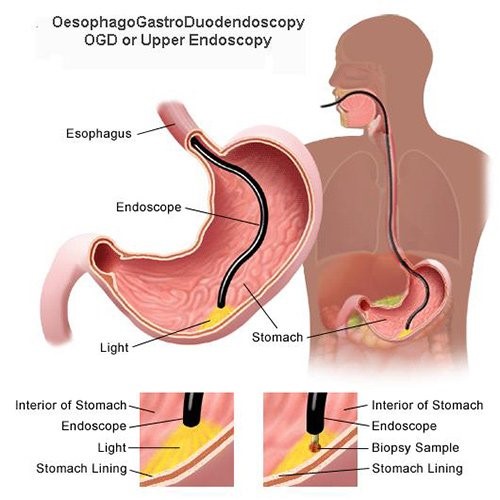GASTROSCOPY
MEDICAL INFORMATION PRIOR TO GASTROSCOPY
(Source SRBGE ; Société Royale Belge d’endoscopie digestive)
Gastroscopy is a visual examination used to identify lesions in the oesophagus, stomach and duodenum.
It is useful for your doctor in determining the cause of your symptoms.
• WHY CHOOSE GASTROSCOPY?
It is currently the reference examination for exploring the oesophagus, stomach and duodenum. It reveals any lesions and allows biopsies to be taken (removal of a fragment of tissue for study under the microscope).
• HOW TO PREPARE?
You must not eat, drink or smoke for 6 hours before the test.
• HOW WILL YOUR GASTROSCOPY WORK?
The examination uses a flexible device called an endoscope, which is inserted through the mouth after a local anaesthetic and any intravenous painkillers have been administered.
The examination is performed while lying on your left side and is not painful. You will not have any difficulty breathing as the endoscope does not go into your lungs.
You are asked to breathe calmly and to let the saliva run from your mouth. During the examination, air is blown in to smooth out the walls, which may cause you to breathe out.
If necessary, completely painless biopsy samples can be taken.
Between each patient, the endoscope is machine-disinfected; the accessories used are either sterilised or discarded if they are single-use.
While waiting for the throat to awaken, you will need to fast for a further 30 minutes after the examination.
• WHAT COMPLICATIONS CAN ARISE?
Any medical procedure, exploration or intervention on the human body, even when carried out under conditions of competence and safety that comply with current scientific knowledge and the regulations in force, involves a risk of complication.
Complications of gastroscopy are very rare. They include perforation, haemorrhage, cardiovascular and respiratory problems and infection. In exceptional cases, they may require hospitalisation. They may be exacerbated by your medical and surgical history or by the use of certain treatments.
All these complications usually appear during the endoscopy, but may also become apparent a few days after the examination (abdominal and chest pain, vomiting of red or black blood, coughing, fever, chills, etc.).
• Contacts:
Gastroenterology secretariat at Ste-Elisabeth: 02/614.27.10


